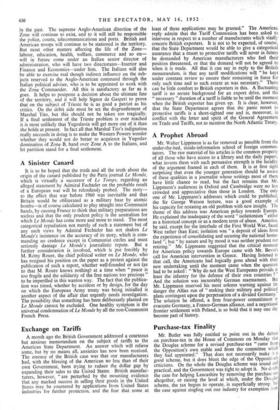A Prophet Abroad
Mr. Walter Lippmann is as far removed as possible from the under-the-bed, inside-information school of foreign commen- tators. The raw material of his articles is the common property of all those who have access to a library and the daily papers; what invests them with such persuasive strength is the lucidity of the argument framed in each of them. It is at first sight surprising that even the younger generation should be aware of these qualities in a journalist whose writings most of them have little chance to read, but the fact remains that Mr. Lippmann's audiences in Oxford and Cambridge were no less crowded and appreciative than those in London. The only one of Mr. Lippmann's addresses which could be published, the Sir George Watson lecture, was a good example of his capacity for restating an old problem with new insight. The theme of this address was American policy towards Europe. He explained the inadequacy of the word " isolationism " either as a historical concept or as a modern term of abuse. America, he said, except for the interlude of the First World War, faced West rather than East; isolation was "a deposit of ideas from the experience of consolidating and securing the national home- land "; but " by nature and by mood it was neither prudent nor retiring." Mr. Lippmann suggested that the critical moment for American policy towards Europe came with Mr. Bevin's call for American intervention in Greece. Having listened to that call, the Americans had logically gone ahead with their new undertaking until the moment came when the question had to be asked: "Why do not the West Europeans provide at least the infantry for the defence of their own countries ? " And the solution was inexorably German rearmament. But Mr. Lippmann reserved his most solemn warning against the danger the Allies run of "making their military and political plans contingent upon the perpetuation of a divided Germany." The solution he offered, a firm four-power commitment to evacuate Germany, a Franco-German alliance, and a negotiated frontier settlement with Poland, is so bold that it may one day become part of history.


































 Previous page
Previous page